Discover the best ai assistant for work in our 2025 guide. Compare top tools, features, pricing, and real-world benefits to boost productivity today.
November 18, 2025 (3mo ago)
best ai assistant for work: Top tools for 2025
Discover the best ai assistant for work in our 2025 guide. Compare top tools, features, pricing, and real-world benefits to boost productivity today.
← Back to blog
The constant flood of emails, meetings, and project updates can feel impossible to manage. You're not just looking for another app; you're looking for a real partner that can think, organize, and even take on tasks for you. That's the promise of an AI assistant, a tool designed to cut through the noise so you can focus on what actually matters. The broader impact of how AI tools can revolutionize productivity for businesses is huge, changing the whole game of how we tackle our daily workload.
But with so many options popping up, how do you find the right one for your specific needs? This guide cuts through the marketing hype to give you a real-world look at the best AI assistant for work**. We break down who each tool is really for, what it actually does, and its hidden limitations. You'll get an honest assessment of everything from AI embedded in your daily apps like Slack and Google Workspace to innovative platforms that blend automation with human expertise.
We've done the research so you don't have to. Each entry includes screenshots, direct links, and clear pros and cons to help you make a smart decision. This list is designed to help you find a co-pilot that actually transforms your workday, not just adds another login to your list. We'll explore solutions ideal for executives, project managers, freelancers, and even neurodivergent users who need a more structured workflow. Let's find the right fit for you.
1. Fluidwave
Fluidwave is a really interesting contender for the best AI assistant for work because it mixes smart automation with a practical human touch. It's a full-on task management platform designed not just to organize your work, but to actively lighten your load. At its heart, Fluidwave uses AI features like auto-prioritization and workflow automation to bubble your most critical tasks to the top, promising to save users over four hours each week.
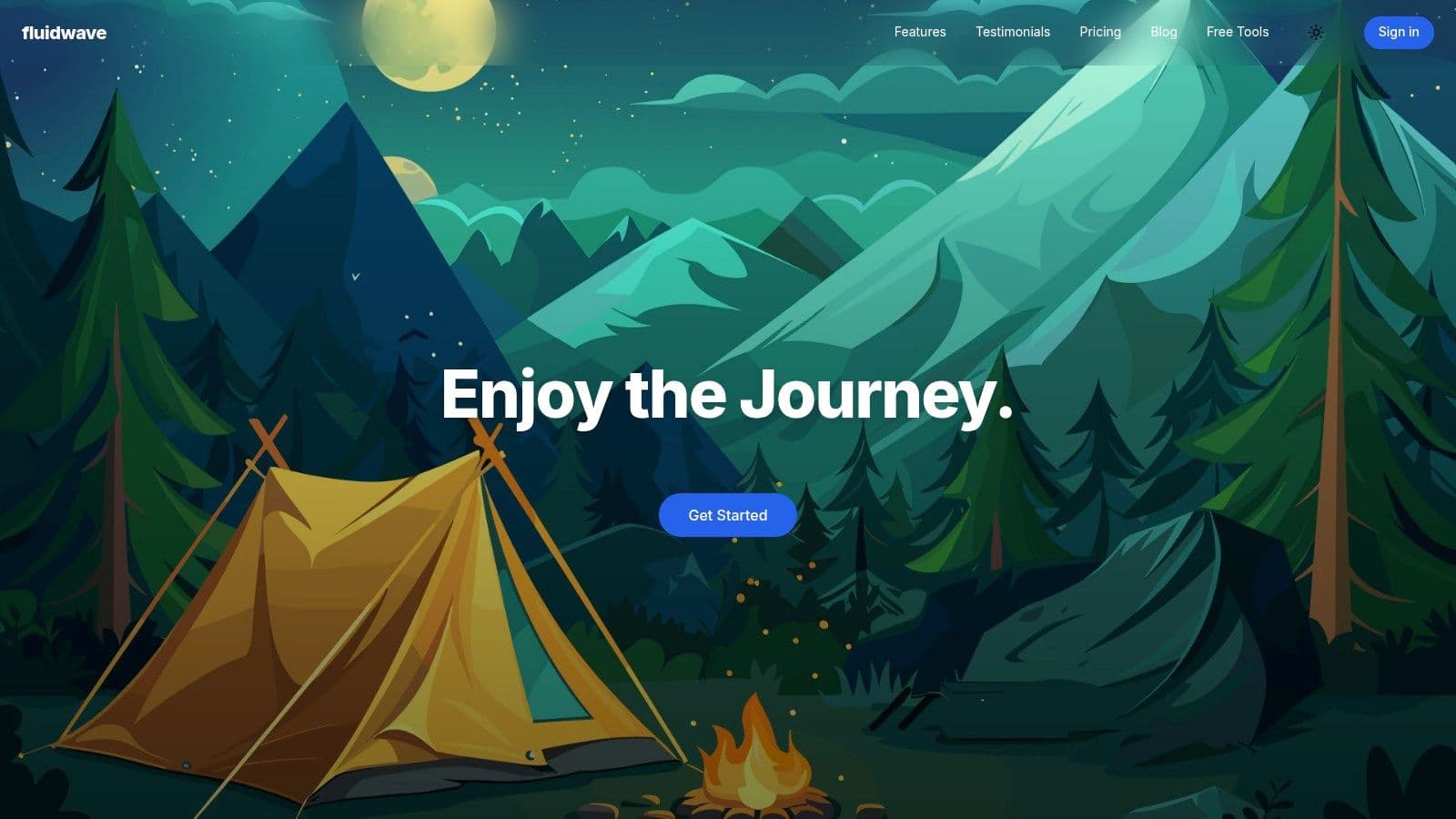
What really makes Fluidwave stand out is its hybrid model. It combines its smart AI tools with a planned pay-per-task marketplace of human virtual assistants. This lets you seamlessly delegate tasks you can’t automate, moving from AI-assisted management to human-powered execution all in one place. This could be a game-changer for execs and founders who need to offload complex work without the headache of hiring or managing subscriptions. For a deeper look into this model, read more about how Fluidwave serves as an AI executive assistant.
The platform is built for speed and deep focus, with a clean, distraction-free interface and multiple views (Kanban, Calendar, List) to suit any workflow. It also supports unlimited shared workspaces, making it super scalable for growing teams.
Standout Features & Benefits
- Hybrid AI + Human Delegation: Fluidwave's core strength is its mix of AI-powered task prioritization with an on-demand network of human assistants, offering a complete delegation solution.
- Subscription-Free Pricing: It has a solid free-forever plan with all core features and an optional one-time purchase of $34.95 for a Premium upgrade, getting rid of recurring subscription costs.
- Focus-Oriented Design: The platform's instant-response interface and clean UI are built to cut down on distractions and help users, including neurodivergent individuals, get into a state of flow.
- Scalable Collaboration: With unlimited shared workspaces and users, it's designed to grow with your team, supported by Google Calendar and Todoist integrations.
Potential Drawbacks
While the vision is compelling, the full human-assistant delegation and pay-per-task marketplace are listed as "coming soon," so users can't yet access the platform's complete hybrid functionality. Also, while it has a solid web and macOS app, native mobile apps for iOS and Android aren't currently listed.
Website: https://fluidwave.com
2. Microsoft 365 Copilot
For companies that are all-in on the Microsoft ecosystem, Copilot is the quintessential AI assistant for work. It doesn't just answer questions; it actively jumps into your tasks within the apps you use every day. Its biggest plus is the deep, contextual integration across the whole Microsoft 365 suite—Teams, Outlook, Word, and Excel—using your company’s internal data through Microsoft Graph to give you responses that are actually grounded in your work.

Imagine asking Copilot in Teams to summarize a meeting you missed, pinpoint key action items, and then draft follow-up emails in Outlook based on that summary. This smooth workflow is its superpower. It can whip up an entire PowerPoint presentation from a Word document or analyze complex data in Excel with plain English prompts, making it a massive productivity booster.
Key Use Cases & Implementation
- Meeting Productivity: Get real-time summaries, track decisions, and assign action items directly within Microsoft Teams.
- Content Creation: Draft documents in Word, generate presentation outlines in PowerPoint, or create email responses in Outlook based on your calendar and internal files.
- Data Analysis: Use natural language to ask questions about your data in Excel, helping you spot trends without wrestling with complex formulas.
Access and Pricing
To get Copilot, you need a qualifying Microsoft 365 Business or Enterprise license, and the add-on usually costs around $30 per user per month. While there's no free trial, its value is pretty obvious for teams already paying for the Microsoft suite. For more advanced stuff, pay-as-you-go agents offer more capabilities but can add extra costs, which is something for the IT budget planners to keep in mind. The experience is seamless, with Copilot just showing up as a familiar sidebar or feature inside each app.
Why It Made the List: Its incredible integration with Microsoft 365 apps and enterprise-level security make it the best AI assistant for work if your company runs on Microsoft.
3. Google Workspace with Gemini
For teams that live and breathe in Google’s world, Gemini for Workspace is the best AI assistant for work that makes collaboration a breeze. It puts AI right into the Google apps your team uses every day, from Gmail and Docs to Sheets and Meet. The main benefit is how smoothly it fits into your existing workflows and company data stored in Google Drive, making sure AI-powered suggestions and summaries are relevant and know what's going on.
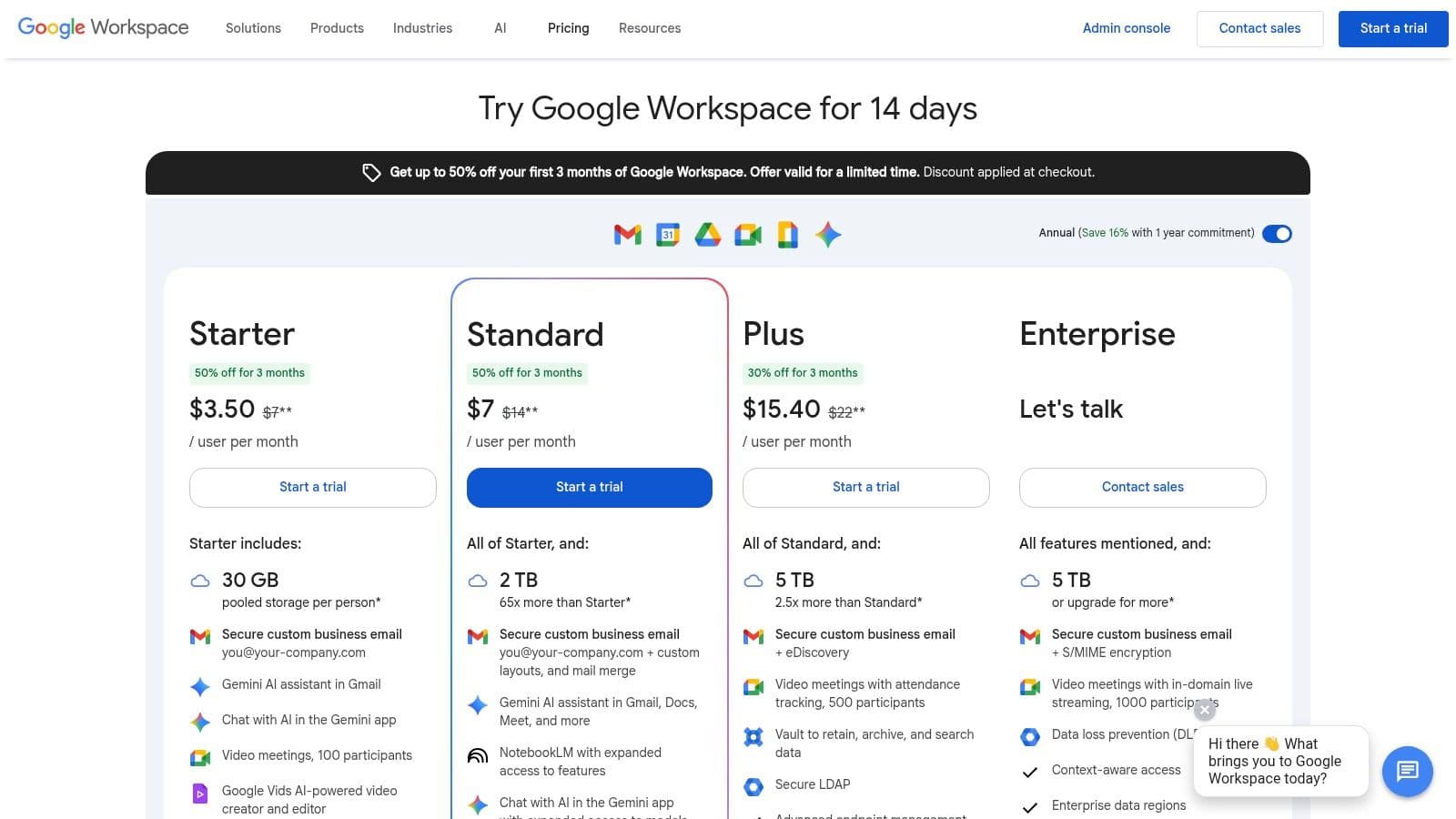
This native integration lets you ask Gemini to draft an email in Gmail based on a Google Doc, summarize a long thread of conversations, or generate project plans in Sheets. Its ability to create custom visuals for Slides or take meeting notes in Meet makes it an indispensable tool for boosting team productivity without having to constantly switch between different apps. The user experience is intuitive, with Gemini features appearing right inside the app interfaces.
Key Use Cases & Implementation
- Communication Efficiency: Draft, reply to, and summarize emails in Gmail. Help refine your writing and change the tone in Google Docs.
- Meeting and Project Management: Generate meeting summaries and action items in Google Meet, or create project templates and track progress in Sheets.
- Content Generation: Create full presentations from a simple prompt in Slides or get help writing reports and brainstorming ideas in Docs.
Access and Pricing
Gemini for Workspace is now included in most Google Workspace Business and Enterprise plans at no extra charge, which makes it easy for existing customers to start using it. Certain features and more powerful models are available in the higher-tier plans, so it's worth checking your current subscription. Enterprise-grade admin controls and compliance certifications (SOC, ISO, HIPAA support) are built-in, which is a big deal for organizations that handle sensitive data.
Why It Made the List: Its deep, native integration across the Google Workspace suite and simplified pricing make it the perfect choice for businesses already invested in Google's collaboration tools.
4. OpenAI ChatGPT
As the tool that basically made generative AI a household name, ChatGPT is still a powerhouse and a super versatile AI assistant for work. Its strength is its amazing general-purpose reasoning, making it the go-to for brainstorming, digging into complex research, drafting content, and even helping with code. While it's not built into specific business suites like Copilot, its power is in its flexibility and the massive ecosystem that's grown up around it.
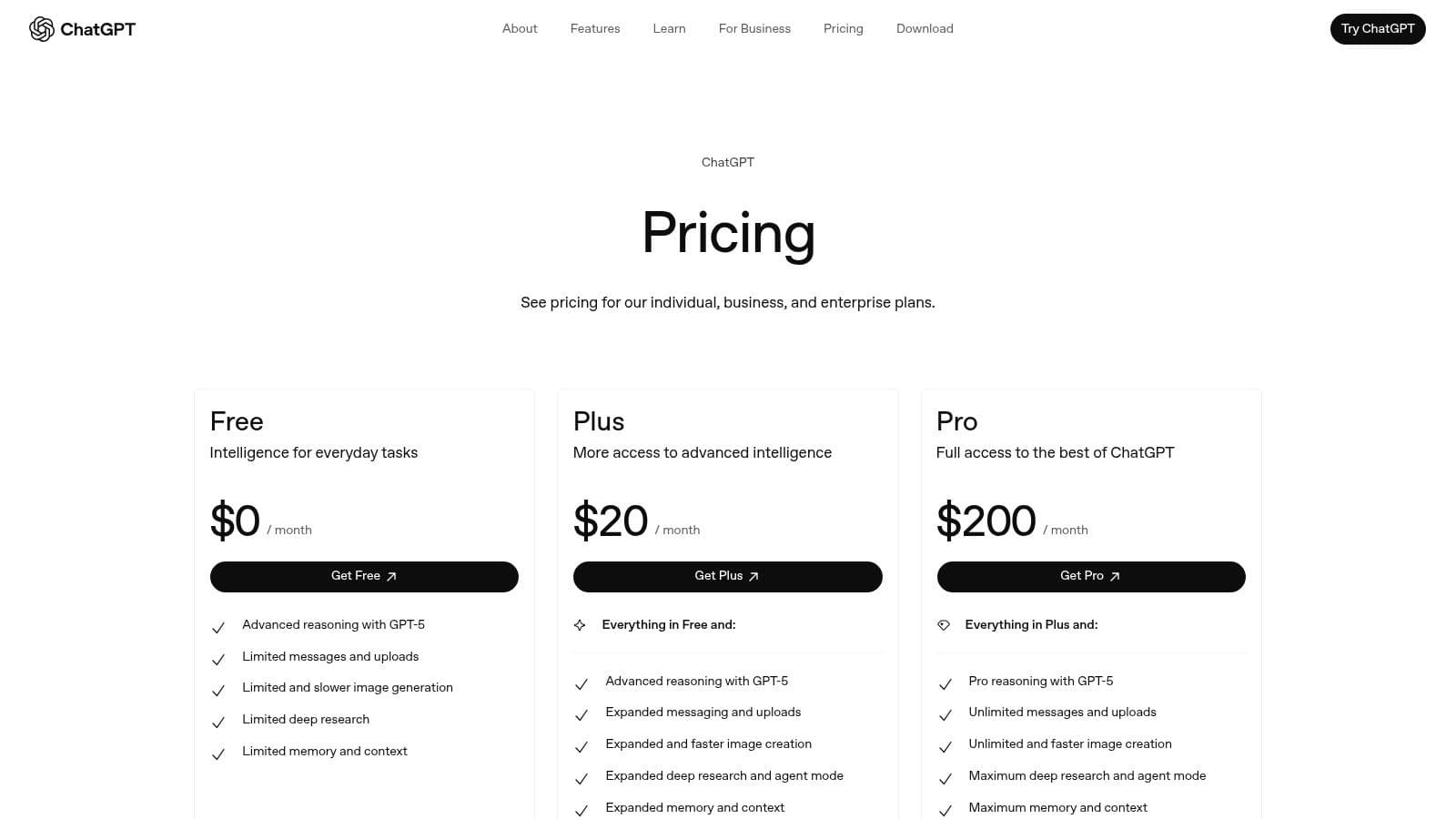
For business users, ChatGPT offers special plans that tackle enterprise concerns like data privacy and team management. You can create custom GPTs tailored to specific company workflows, trained on your internal documents, or connect to other software through its API and connectors. This lets it act as a powerful, standalone hub for a huge range of knowledge-based tasks that don't fit neatly into a single app.
Key Use Cases & Implementation
- Research & Analysis: Quickly pull together information from documents or the web, analyze qualitative data, and generate summaries for reports.
- Content Generation: Draft anything from marketing copy and blog posts to technical documentation and internal memos.
- Coding & Development: Help with writing code, squashing bugs, and explaining complex programming concepts, speeding up development cycles.
Access and Pricing
ChatGPT has a few tiers, including a capable Free version. The Plus plan (around $20/month) gives you priority access and advanced models. For companies, the Business and Enterprise tiers offer crucial features like an admin console, SSO, compliance checks, and a guarantee that your data isn't used for training. Just be sure to pick the right business plan to keep your company data private and secure. Getting it to work with your internal systems often requires setting up some connectors.
Why It Made the List: Its best-in-class general reasoning, powerful customization through GPTs, and clear enterprise privacy controls make it a top-tier standalone AI assistant for work.
5. Anthropic Claude
Anthropic's Claude sets itself apart as a very capable AI assistant for work, with a big focus on thoughtful analysis, nuanced writing, and tackling complex problems. It's great at processing and summarizing large documents, making it perfect for researchers, analysts, and writers who need to distill dense information quickly. It has a reputation for being accurate and helpful on complex knowledge tasks, which makes it a reliable partner for in-depth work.

Unlike some of its rivals that are stuck inside a specific software suite, Claude works as a more versatile, standalone assistant that can scale from one person to an entire enterprise. With features like single sign-on (SSO), admin controls, and connectors for services like Slack and Microsoft 365, it can be securely plugged into existing company workflows, providing a central spot for intelligent help without being tied to a single ecosystem.
Key Use Cases & Implementation
- Complex Document Analysis: Quickly summarize research papers, legal contracts, or financial reports to pull out key insights and data points.
- Content and Code Generation: Draft sophisticated articles, marketing copy, or technical documentation. Developers can use Claude Code for help with programming tasks.
- Team Collaboration: Use connectors to bring Claude's analytical power into shared workspaces like Slack for brainstorming, summarizing conversations, and answering team questions.
Access and Pricing
Claude offers a free tier with usage limits, while the Pro plan for individuals is priced at $20 per month. The Team plan, which adds features like central billing and admin controls, costs $30 per user per month but requires you to buy at least 5 seats. This can make it a pricier option for very small teams. The user interface is clean and conversational, and a desktop app is available for easy access.
Why It Made the List: Claude is the best AI assistant for work that involves deep analysis and sophisticated writing, offering powerful models that scale securely from individual power users to entire enterprise teams.
6. Slack (with built-in AI)
For teams where work conversations live and breathe in Slack, its built-in AI features turn the platform into a powerful and context-aware assistant. Instead of being a separate tool, Slack AI is woven right into the communication fabric of your organization. Its real strength is bringing smart summarization and search to the very place where collaboration happens, cutting down on noise and making it faster to find critical information.

Imagine logging in after a few hours away and getting an instant, AI-powered daily recap of your most important channels, or summarizing a massive thread to catch up in seconds. Slack AI makes this possible, turning overwhelming message streams into concise, actionable insights. This native integration is what makes it a contender for the best AI assistant for work, especially for teams already all-in on the platform.
Key Use Cases & Implementation
- Conversation Summaries: Instantly get the gist of any channel or thread to catch up quickly without reading every single message.
- AI-Powered Search: Ask natural language questions to find specific files, messages, or decisions buried deep in your Slack history.
- Daily Recaps: Get a personalized digest of key conversations and action items from the channels you care about most.
Access and Pricing
Slack AI isn't a separate add-on; its features are included in paid plans. You get access starting with the Pro plan (from $8.75 per user/month) and it gets better in the Business+ and Enterprise Grid tiers. The more advanced features, like deep Salesforce integration and better compliance, are saved for the higher-priced enterprise plans. While the old dedicated Slack AI add-on is gone, this bundled approach makes it easy for teams already using or thinking about a paid Slack subscription.
Why It Made the List: Its seamless integration directly within the main communication hub for millions of teams makes it an incredibly practical and easy way to use AI for daily productivity.
7. Zoom AI Companion
For teams whose work life revolves around Zoom, the AI Companion is a deeply integrated and increasingly powerful assistant. It's more than just a meeting transcription tool; it works across the entire Zoom Workplace ecosystem, including meetings, chat, phone, and whiteboard. Its key advantage is convenience. It's already there in the tools your team uses for daily communication, making it a super easy addition to your workflow.
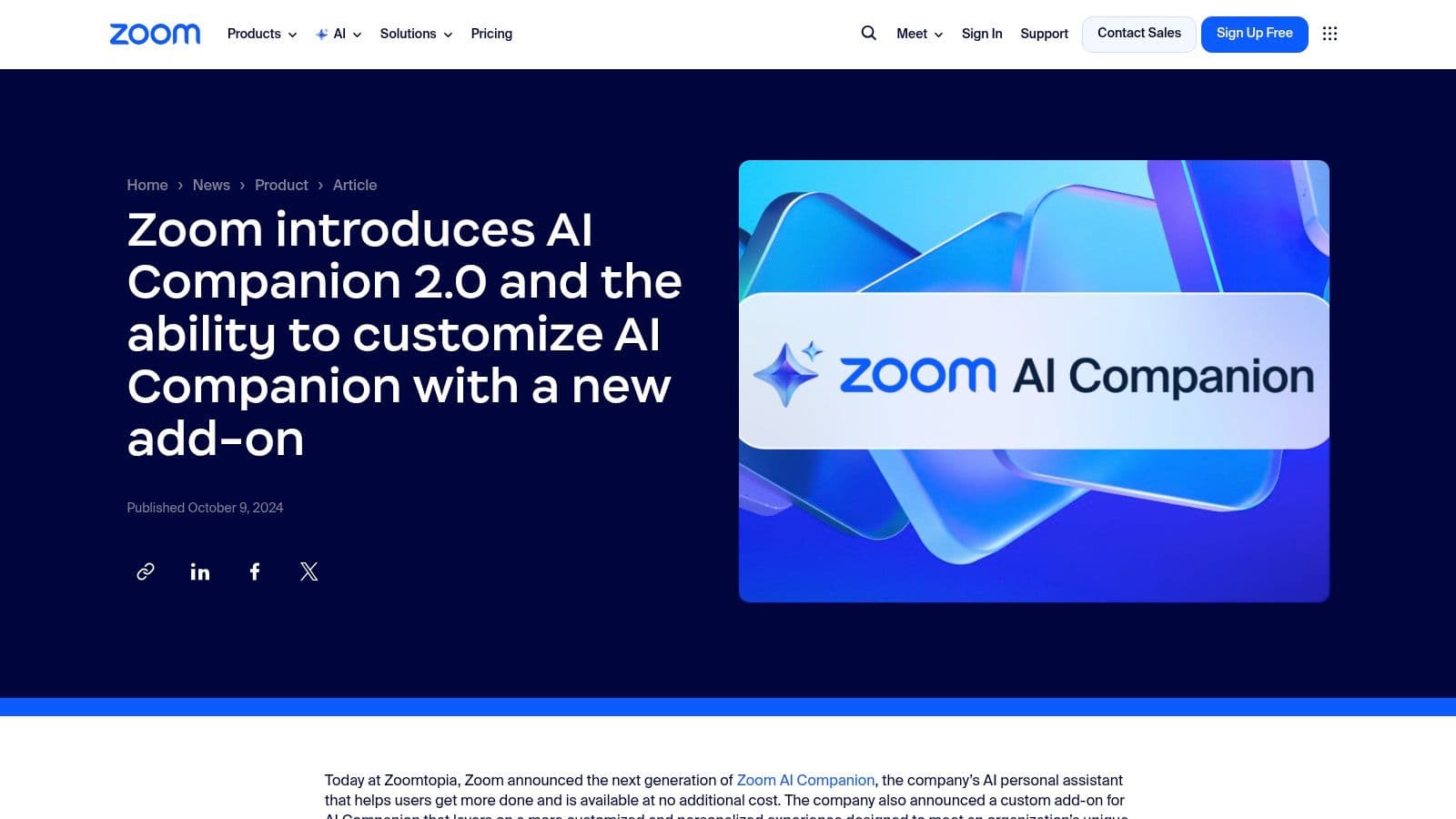
The Companion is great at capturing the essence of conversations. It can generate meeting summaries, highlight key action items, and even help you draft chat messages or whiteboard ideas. As it grows, Zoom is adding more agent-like features for scheduling and task management, positioning it as a central hub for collaborative work and a strong contender for the best AI assistant for work within its own environment.
Key Use Cases & Implementation
- Meeting Recap & Follow-Up: Instantly generate summaries and next steps from any recorded meeting, saving hours of manual review.
- Enhanced Communication: Use AI to help compose clear chat messages and emails or to organize brainstormed ideas on a Zoom Whiteboard.
- Real-Time Assistance: Ask questions during a meeting about what you might have missed without interrupting the speaker.
Access and Pricing
One of Zoom AI Companion's best features is its price: it's included at no extra cost with paid Zoom Workplace accounts. This gives immediate value to millions of users. For organizations looking for deeper personalization and advanced capabilities, there's an optional Custom AI Companion add-on. While feature availability can vary, its rapid development makes it a platform to watch.
Why It Made the List: Its seamless integration into the widely used Zoom platform and inclusion with paid plans make it an incredibly accessible and practical AI assistant for communication-heavy teams.
8. Notion AI
For teams that live in a centralized knowledge base, Notion AI turns a documentation hub into an active partner in your workspace. Its power comes from being native to the environment where your plans, wikis, and projects already live. Instead of exporting data to another tool, the AI works directly inside your pages, making it a highly contextual and efficient assistant for knowledge management and content creation.

Imagine instantly summarizing a long project brief, pulling action items from scattered meeting notes, or drafting the first version of a marketing blog post right inside your content calendar. Notion AI is great at these tasks because it understands the structure and context of your workspace. This smooth integration removes friction and keeps your team's momentum going, meaning you don't have to switch between different apps for brainstorming and getting work done.
Key Use Cases & Implementation
- Knowledge Synthesis: Use the AI-powered enterprise search (Q&A) to ask questions and get answers sourced directly from your entire workspace.
- Content Augmentation: Improve writing, change tone, translate text, or summarize complex documents without leaving the page.
- Workflow Automation: Automatically generate tables, draft project plans, or create meeting agendas based on simple prompts.
Access and Pricing
Notion AI is available as an add-on to any Notion plan, even the free one. The add-on costs $10 per member per month (or $8 if you pay annually), which gives you unlimited AI access. This simple pricing makes it an affordable option for individuals and teams of all sizes. The user experience is intuitive, with AI features seamlessly built into the standard text editor menu, making it easy to pick up without a lot of training.
Why It Made the List: Notion AI is the best AI assistant for work when your team's "single source of truth" is already Notion. Its deep integration within the docs and databases you use daily makes it a powerful, context-aware productivity tool.
9. ClickUp with ClickUp AI
For teams that want AI built right into their all-in-one work management platform, ClickUp AI is a powerful choice. Instead of being a separate tool, it works as a native assistant inside ClickUp’s ecosystem of tasks, documents, and whiteboards. Its main advantage is being context-aware within your project data, allowing it to summarize comment threads, generate action items from meeting notes, or draft project updates based on task progress.

This integration streamlines workflows by keeping AI-driven actions and project execution in the same place. You can use it to instantly create subtasks for a complex project, rewrite a document to be more concise, or generate tables and templates on the fly. This makes it an excellent AI assistant for work when the goal is to boost productivity within an existing project management setup, cutting down on the need to jump between multiple apps. For a deeper look, you can learn more about using AI in project management.
Key Use Cases & Implementation
- Task Management: Automatically generate subtasks, summarize task comments, and write task descriptions or project updates.
- Content & Documentation: Draft, edit, and summarize content directly within ClickUp Docs and Whiteboards.
- Workflow Automation: Use AI to generate templates for common processes or create action items from unstructured notes.
Access and Pricing
ClickUp AI is available as an add-on to any paid ClickUp plan (starting from the Business tier). It costs $5 per member per month and is billed for every member in the workspace, which can add up for larger teams. A free trial of the AI features is available, letting teams test it out before committing. The feature-rich nature of the core ClickUp platform can have a bit of a learning curve, but the AI tools themselves are intuitive and well-integrated into the user interface.
Why It Made the List: Its seamless integration into a comprehensive work management platform makes it ideal for teams looking to boost their project management and documentation processes with AI without leaving their primary tool.
10. Zapier Agents
For businesses looking to put AI to work across their existing software stack, Zapier Agents offers a powerful, easy-to-use solution. Instead of being a conversational chatbot, it lets you build autonomous AI "agents" that can browse the web, access live data, and perform multi-step actions across thousands of integrated apps. This makes it a fantastic AI assistant for work that's focused on automating complex operational and support workflows.
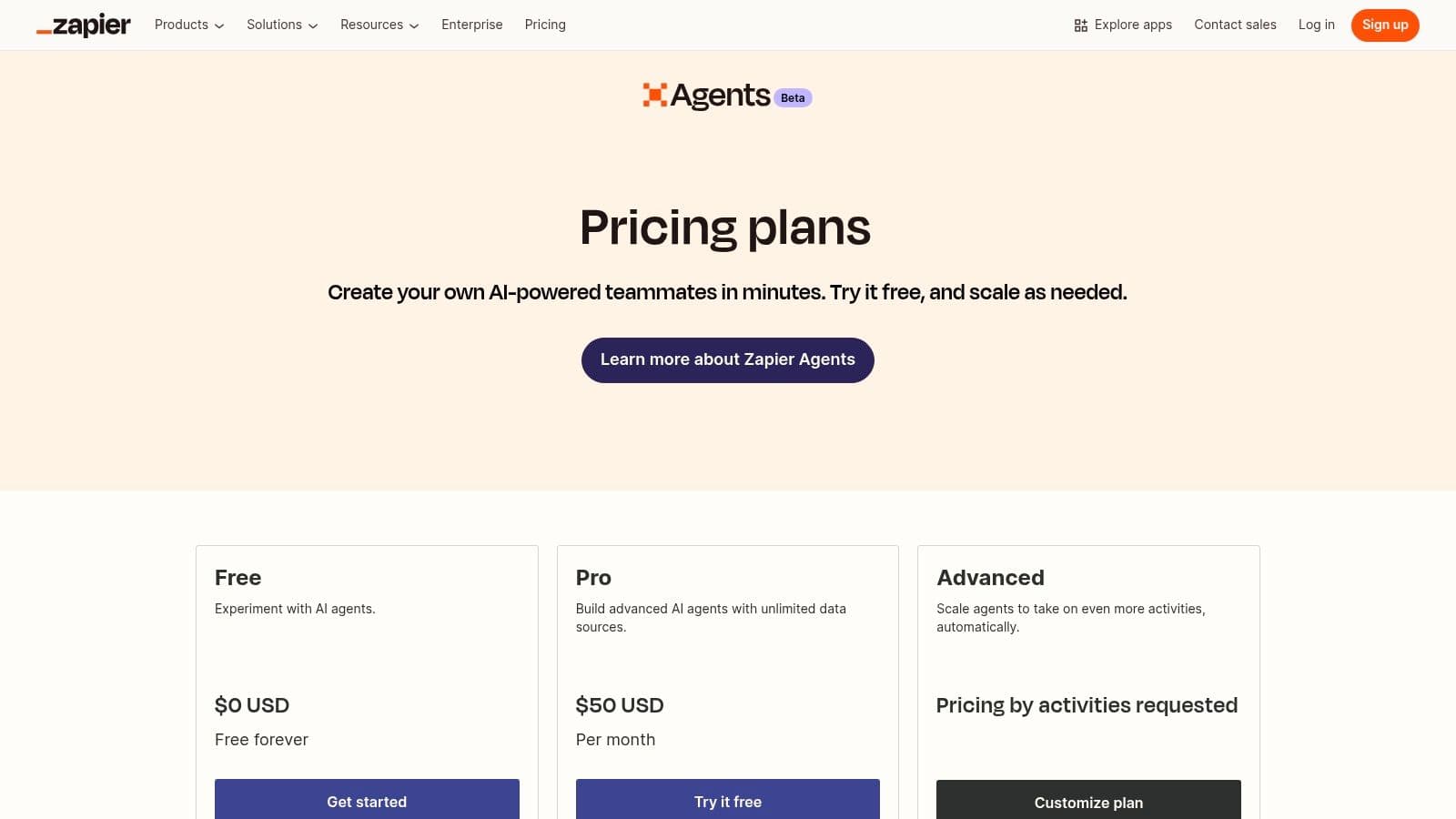
Think of it as giving AI a specific job within your company. You could create an agent that monitors customer support tickets for negative sentiment, finds the customer's order history in your e-commerce platform, and then drafts a personalized follow-up email for your team to review. This goes beyond simple one-to-one automation into more sophisticated, AI-driven processes.
Key Use Cases & Implementation
- Lead Enrichment: Build an agent that takes a new lead from a CRM, browses LinkedIn for their company details, and updates the CRM record automatically.
- Customer Support Triage: Design an agent to analyze incoming support requests, categorize them by urgency, and assign them to the correct team in your helpdesk software.
- Content Curation: Instruct an agent to monitor specific RSS feeds or websites for news on a topic, summarize the findings, and post them to a team Slack channel.
Access and Pricing
Zapier offers a free tier for experimenting, letting you build and test agents with limited actions. Paid plans are activity-based, starting from around $20 per month for more "activities" or steps your agents can perform. This model is scalable but requires you to keep an eye on it to predict costs, as complex workflows can eat up activities quickly. The user experience is built on Zapier's familiar interface, making it pretty straightforward for existing users to start building agents without deep engineering knowledge.
Why It Made the List: Zapier Agents is great at connecting AI decision-making with practical action across your existing tools, making it the best choice for automating complex, multi-app operational tasks.
11. GitHub Copilot
For software developers and engineering-heavy teams, GitHub Copilot is probably the most specialized and effective AI assistant for work you can get. It acts as an AI pair programmer right inside a developer's coding environment (IDE), suggesting entire lines of code or complete functions in real-time. Its main strength is its deep integration into the coding workflow, understanding the context of your project to provide relevant, high-quality code suggestions and speed up development.
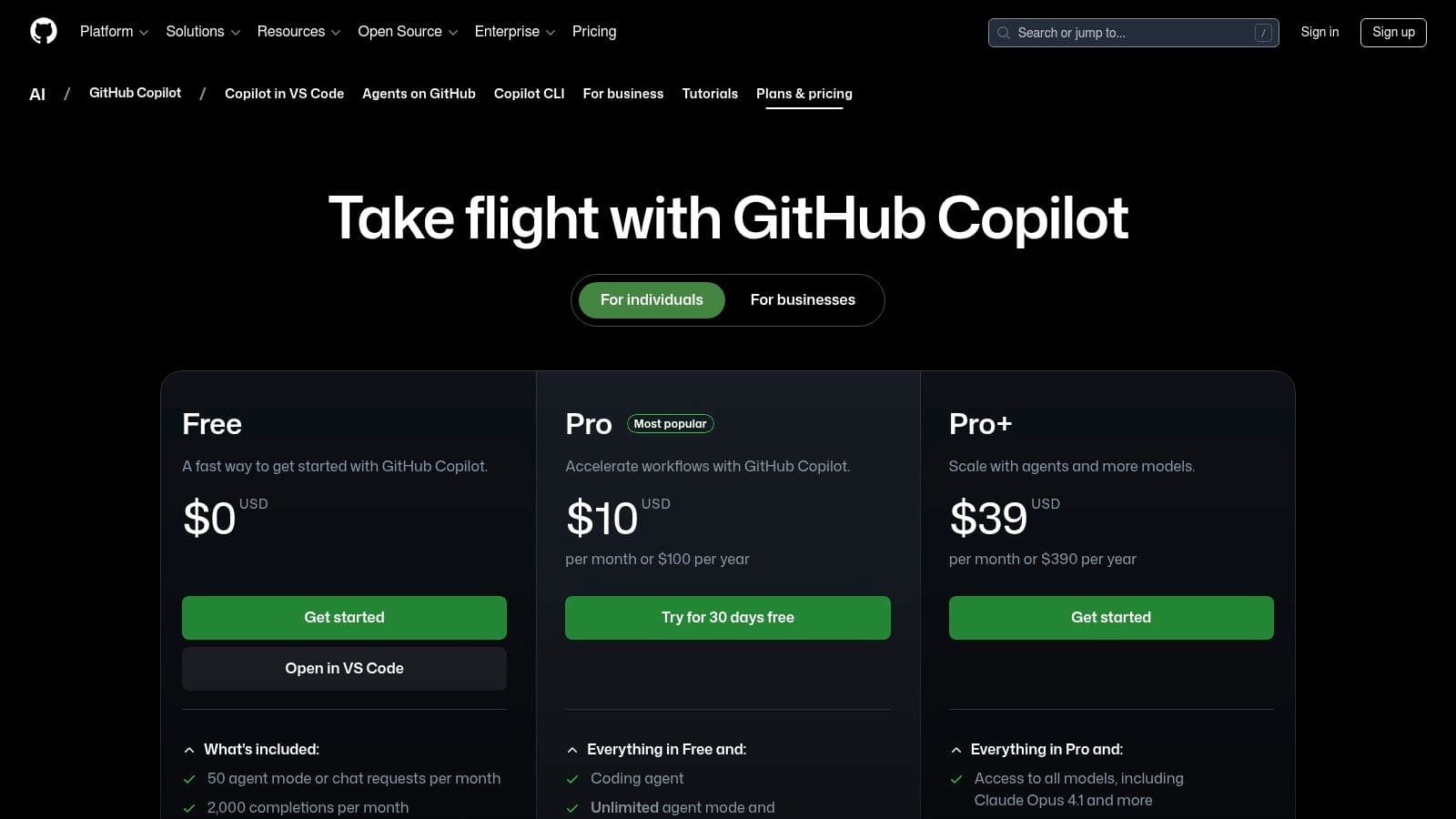
Imagine typing a function name and a comment describing what it should do, and Copilot instantly spits out the complete code. This seamless interaction goes beyond just writing code; it helps with debugging, writing tests, and even generating documentation. By integrating with tools like VS Code, JetBrains, and the command line (CLI), it meets developers exactly where they work, reducing context switching and boosting focus.
Key Use Cases & Implementation
- Code Completion & Generation: Speed up coding by accepting AI-generated suggestions, from single lines to complex algorithms.
- Boilerplate Reduction: Automatically generate repetitive code, unit tests, and API calls, freeing up developers for more complex problem-solving.
- Learning & Onboarding: Use natural language chat within the IDE to understand unfamiliar codebases or learn new programming languages.
Access and Pricing
GitHub Copilot is available through several subscription tiers. The Individual plan is $10 per month, while the Business plan costs $19 per user per month, adding administrative controls and policy management. The Enterprise tier at $39 per user per month offers advanced security and personalization. While its value is limited for non-technical roles, for a development team, the productivity gains often provide a clear return on investment. The experience is tightly integrated, feeling less like a separate tool and more like an extension of the IDE itself.
Why It Made the List: Its unmatched integration into the developer workflow and powerful code generation capabilities make it the definitive AI assistant for engineering teams, boosting productivity and code quality.
12. Superhuman Suite
For professionals whose work is all about communication and content, the Superhuman Suite offers a tightly integrated bundle of AI-native tools. It combines its famous AI-powered email client with a writing assistant, a Coda workspace, and a cross-app AI assistant named 'Go'. The suite’s main advantage is its focus on streamlining high-speed communication and content workflows by putting key tools under a single subscription.

The platform is designed to eliminate context switching. For example, you can use the 'Go' assistant to pull data from a CRM like Salesforce, use the integrated writing partner to draft a client update based on that data, and send it via the lightning-fast Superhuman Mail interface without ever leaving the application. This unified approach makes it a strong contender for the best AI assistant for work in communication-heavy roles.
Key Use Cases & Implementation
- Email & Communication Velocity: Use Superhuman Mail's AI to triage your inbox, draft responses, and summarize long threads in seconds.
- Integrated Content Creation: Use the Coda workspace and writing partner to manage projects and create documents with AI assistance across your apps.
- CRM-Powered Workflows: Connect to HubSpot or Salesforce to pull contact information and sales data directly into your communication tasks.
Access and Pricing
Superhuman Suite offers tiered plans, starting with the AI plan at $49 per user per month (billed annually). More advanced business tiers unlock key enterprise features like SSO, DLP, and expanded CRM integrations. While the company recently rebranded and is still tweaking its feature sets, the core value is clear. Users should definitely take advantage of any trial period to see how the newly integrated components fit their specific workflow needs.
Why It Made the List: It bundles several critical AI tools for communication and content into one cohesive suite, making it ideal for roles that live in their inbox and documents.
Top 12 AI Assistants for Work
| Product | Core features | UX & Quality (★) | Pricing & Value (💰) | Target audience (👥) | Unique selling points (✨) |
|---|---|---|---|---|---|
| Fluidwave 🏆 | AI auto-prioritization, automation, Table/List/Calendar/Kanban/Cards, human virtual assistants (pay-per-task) | ★★★★☆ — distraction-free, instant-response; saves 4+ hrs/wk | 💰 Free forever; one-time $34.95 Premium; pay-per-task delegation (coming soon) | 👥 Busy professionals, teams, founders, freelancers, VAs, neurodivergent users | ✨ Hybrid AI + pay-per-task human assistants; real-time collaboration; 🏆 Recommended |
| Microsoft 365 Copilot | Copilot across Teams/Outlook/Word/Excel/PowerPoint; Microsoft Graph integration | ★★★★☆ — work-grounded, enterprise polish | 💰 Requires qualifying M365 licenses; enterprise pricing | 👥 Enterprises standardized on Microsoft 365, IT/admins | ✨ Deep M365 integration with enterprise security/compliance |
| Google Workspace with Gemini | Gemini in Gmail/Docs/Sheets/Meet; NotebookLM, Drive/PDF/video summaries | ★★★★☆ — embedded AI across apps | 💰 Included in Business/Enterprise plans; plan-dependent features | 👥 Google-first teams needing admin controls & compliance | ✨ Workspace-wide AI + Drive/NotebookLM summaries |
| OpenAI ChatGPT | General-purpose assistant, Custom GPTs, connectors, business controls | ★★★★★ — best-in-class reasoning & ecosystem | 💰 Free/Plus/Business/Enterprise tiers; flexible usage/credits | 👥 Individuals & orgs needing versatile AI workflows | ✨ Custom GPTs, wide connector ecosystem, strong reasoning |
| Anthropic Claude | Assistant for analysis/writing/coding; connectors; team/admin features | ★★★★☆ — accurate on complex knowledge work | 💰 Team & premium seat pricing; 5-seat min for team plans | 👥 Teams focused on safe, high-quality knowledge work | ✨ Safety-first design; Claude Code & enterprise search |
| Slack (with built-in AI) | Conversation summaries, AI search, daily recaps, Salesforce integrations | ★★★★☆ — AI where conversations happen | 💰 AI features on paid tiers; Enterprise+ for advanced AI | 👥 Teams using Slack as central communication hub | ✨ Conversation-native AI and recaps inside workflows |
| Zoom AI Companion | Meeting summaries, action items, cross-app assistance (chat/phone/whiteboard) | ★★★★☆ — included with paid accounts; fast updates | 💰 Included in paid Workplace; Custom Companion add-on (~$12/user/mo) | 👥 Organizations that run on Zoom meetings & calls | ✨ Cross-modal meeting AI with agentic scheduling/actions |
| Notion AI | AI agent, meeting notes, research mode, enterprise search | ★★★★☆ — native AI in docs/wiki/projects | 💰 Tier-based AI limits; best when Notion is system of record | 👥 Teams centralizing docs, knowledge & workflows | ✨ Docs + tasks + native AI reduces app switching |
| ClickUp with ClickUp AI | Docs, tasks, goals, whiteboards + AI add-ons, Connected Search | ★★★★☆ — very feature-rich; needs admin setup | 💰 Competitive base pricing; AI billed per-member/add-on | 👥 SMBs to enterprises needing all-in-one work platform | ✨ Extensive project & portfolio features + AI add-ons |
| Zapier Agents | Agents with live data, web browsing, multi-step actions across apps | ★★★★☆ — low-friction automation for ops | 💰 Free tier; activity-based pricing (monitor usage) | 👥 Ops/support teams automating cross-app workflows | ✨ Agents act across thousands of apps; Chrome extension |
| GitHub Copilot | IDE/chat agents, CLI support, model choices, integrations (VS Code, JetBrains) | ★★★★★ — optimized for developer workflows | 💰 Seat-based business/enterprise plans | 👥 Developers & engineering teams | ✨ Deep IDE integration; code generation & review assistants |
| Superhuman Suite | AI-native email, writing assistant, Coda workspace, cross-app 'Go' | ★★★★☆ — email & writing velocity focus | 💰 Subscription-based; business tiers for integrations | 👥 Communication- and content-heavy roles | ✨ Consolidates email, writing & cross-app AI under one suite |
Making Your Choice: How to Start and What to Expect
Trying to navigate the world of AI assistants can feel overwhelming, but finding the best AI assistant for work is more about finding the right fit than a single, perfect tool. As we've seen, the market has everything from deeply integrated players like Microsoft 365 Copilot and Google Workspace with Gemini, to super specialized platforms like GitHub Copilot for developers or Superhuman for email. The key takeaway is that the 'best' tool really depends on your unique workflow, your team's existing software, and the specific headaches you're trying to fix.
The choice isn't just about features; it's about philosophy. Do you need an AI that lives inside the documents and spreadsheets you already use every day? Or do you need a system, like Fluidwave, that acts as an external delegation layer, automating complex workflows and managing tasks for you? The first enhances your current processes, while the second aims to fundamentally offload them.
Your Action Plan for Selecting an AI Assistant
To move from thinking to doing, avoid "analysis paralysis" by taking a methodical, hands-on approach. The goal is to test these tools against your real-world challenges, not just their marketing claims.
Here's a simple, three-step framework to guide your decision:
- Identify Your Core Pain Point: Before you even look at a feature list, figure out the single biggest point of friction in your workday. Is it the endless cycle of meeting summaries and action items? Is it staring at a blank page when you need to draft proposals or reports? Or is it the mental load of tracking multiple complex projects? Your main pain point is your North Star.
- Run a Pilot Project: Almost every tool on our list offers a free trial or a limited free version. Don't waste this on generic tests. Pick a real, small-scale project or a recurring weekly task. For example, use Notion AI to outline your next team presentation, ask Slack AI to summarize a busy channel for one week, or delegate a multi-step research task to Fluidwave.
- Evaluate Based on Impact, Not Hype: After your trial, be honest about the results. Did the tool actually save you time, or did it just create a new process to manage? Did it reduce your mental load, or did you spend more time correcting its mistakes and dealing with its quirks? The best AI assistant for work is the one that fits in seamlessly and clearly reduces your workload with minimal friction.
Final Considerations for Implementation
As you narrow down your choices, remember to think about the bigger picture. Consider security, data privacy policies, and how the tool will play with your team's existing software. Also, keep in mind that the ecosystem is always changing. Beyond the big names, many specialized productivity tools are adding AI. For example, you might check out Chronoid's AI Assistant documentation to see how AI is being used in time tracking and task management, which could complement your main assistant.
Ultimately, adopting an AI assistant is the first step toward a new way of working. It's about boosting your capabilities, automating the boring stuff, and freeing up your most valuable resource: your focus. Whether you choose an all-in-one powerhouse or a specialized delegator, the right tool will empower you to concentrate on the strategic, creative, and high-impact work that truly drives success.
Ready to move beyond simple AI chat and start truly delegating your work? Fluidwave is designed for professionals who need to offload complex tasks and automate entire workflows, not just enhance them. See how our unique approach to AI-powered delegation can transform your productivity by visiting Fluidwave and starting your free trial.
Focus on What Matters.
Experience lightning-fast task management with AI-powered workflows. Our automation helps busy professionals save 4+ hours weekly.